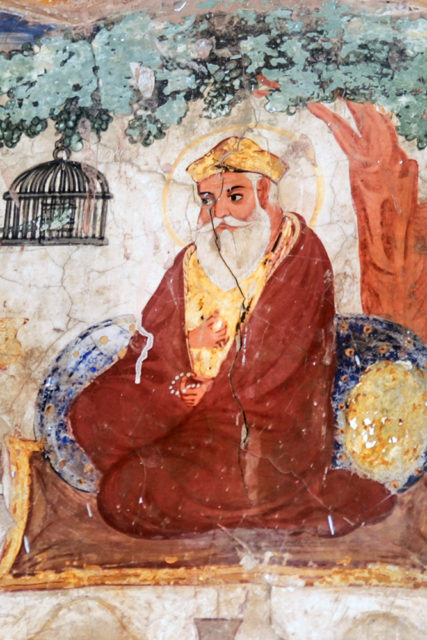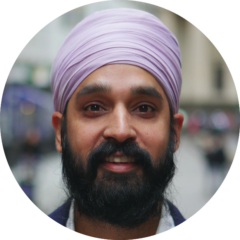(RNS) — Today, Sikhs around the world are celebrating the birth of their founder, Guru Nanak, on a day known as Gurpurab. Also today, Americans across the country are voting for their next slate of leaders on what is known in the United States as Election Day.
As a Sikh American born in the United States, I’m carrying both in my heart today, remembering the wisdom and teachings of the past as I hope for a better future.
Guru Nanak’s Gurpurab is my Sikh side, and Election Day is my American side. Many in the West see these two identities as mutually exclusive. But I experience it differently. For me the two go hand in hand, and what others might see as a split identity, sometimes Sikh and sometimes American, I experience my life in coherence. I’m both at the same time, and so much more, too.
There’s another cultural assumption embedded in this experience: that the Gurpurab belongs to the spiritual realm while Election Day belongs to the political world. I know many who live their lives this way, trying to maintain a sharp distinction between their religious and secular lives. That’s totally fair. No judgment from me.
RELATED: In run-up to midterms, Muslim groups, mosques push for voter engagement
But Sikh teachings lead me to a different way of thinking, one shared by many people around the world and across traditions, which says that deep spiritual practice leads to compassion for the other, and this compassion in turn inspires service and justice. In this way our deep spiritual practice is deeply engaged in the world.
Many religious interpretations follow this basic logic, which motivated some of the religious figures who lived as the best among us.
When we view religion this way, as inspiring self-development and social concern at the same time, it becomes difficult to accept any attempt to draw a line between the spiritual and the political. Indeed, in Guru Nanak’s view, the two are inextricably interlinked.
There are a number of ways in which this outlook shines through in Sikh philosophy. One example is through the innovative vocabulary of Sikh tradition. Guru Nanak and the gurus who followed him as leaders of Sikhi intentionally brought together spiritual and political terms that would otherwise seem to be at odds with one another. Every Sikh is asked to be sant-sipahi, a saint and a warrior at the same time. We learn about seva-simran, serving others and maintaining a meditative practice.
And perhaps most explicitly, we try to maintain a balance of miri and piri, engaging with the world around us while also cultivating ourselves internally.
Many who view Guru Nanak’s life from the outside emphasize his unique worldview and spiritual practice. This is an important dimension of this extraordinary man. But to leave out his social and political commitments misses a crucial part of what made him so special, and unfortunately, this distorted view of his life and teachings has become part of his story in the West.
In one of the earliest accounts Sikhs learn about Guru Nanak’s life, his father gives him money to spend in town, but he gives it away to sadhus — holy men — that he passed by so they could afford the food they needed.
Another common memory of his life recalls how, when it came time for him to wear the sacred thread (janeau), he refused to put it on and accept the privilege of his caste. Instead, he openly rejected the caste hierarchy, even though he would have personally benefited from it — and then he proceeded to develop institutions that explicitly challenged casteism.
RELATED: Defending our sacred right to vote
Both the Guru Granth Sahib (Sikh scripture) and the janamsakhis (early accounts of Guru Nanak’s life) contain references to Guru Nanak speaking out against tyranny. When Babur entered South Asia and massacred civilians, laying the ground for what would eventually become the Mughal Empire, Guru Nanak stood against him forcefully, calling out his atrocities. If this is not social and political concern, I don’t know what is.
Each of these examples from Guru Nanak’s life, along with many more, draws from his basic premise of ik oankar: We are all connected and so is our well-being. To truly find joy and overcome suffering, we can’t just endeavor for ourselves. Life is collective and connective.
So as I sit here today, in my skin as a Sikh and an American, I’m reflecting on how Guru Nanak’s life and teachings can help inform our social and political engagement. A good starting place for myself, and perhaps for many of us, is to reflect on what it truly means to care for ourselves and one another, and how doing so leads us to a shared commitment — to pursue liberty and justice for all.






